Experiences of Japanese American Women during and after World War II
Experiences of Japanese American Women during and after World War II
Living in Internment Camps and Rebuilding Life Afterwards
Precious Yamaguchi
LEXINGTON BOOKS
Lanham Boulder New York London
Published by Lexington Books
An imprint of The Rowman & Littlefield Publishing Group, Inc.
4501 Forbes Boulevard, Suite 200, Lanham, Maryland 20706
www.rowman.com
Unit A, Whitacre Mews, 26-34 Stannary Street, London SE11 4AB
Copyright 2014 by Lexington Books
All rights reserved . No part of this book may be reproduced in any form or by any electronic or mechanical means, including information storage and retrieval systems, without written permission from the publisher, except by a reviewer who may quote passages in a review.
British Library Cataloguing in Publication Information Available
Library of Congress Cataloging-in-Publication Data Available
Yamaguchi, Precious.
Experiences of Japanese American women during and after World War II : living in internment camps and rebuilding life afterwards / Precious Yamaguchi.
pages cm
Includes bibliographical references and index.
ISBN 978-0-7391-9242-9 (cloth : alk. paper) ISBN 978-0-7391-9243-6 (electronic) 1. Japanese AmericansEvacuation and relocation, 19421945. 2. World War, 19391945Japanese Americans. 3. World War, 19391945Concentration campsUnited States. 4. Japanese AmericansSocial conditions. I. Title.
D769.8.A6 Y343 2014
940.53089956073dc23
2014038333
 The paper used in this publication meets the minimum requirements of American National Standard for Information SciencesPermanence of Paper for Printed Library Materials, ANSI/NISO Z39.48-1992.
The paper used in this publication meets the minimum requirements of American National Standard for Information SciencesPermanence of Paper for Printed Library Materials, ANSI/NISO Z39.48-1992.
Printed in the United States of America
Contents
List of Figures
| My Grandfathers Family in Los Angeles, 1910 |
| A Family of Four Generations of Japanese American Women |
| Four Generations of Japanese American Women at a Party in the 1970s |
| A Photo of My Grandparents as Newlyweds After They Were Released from the Internment Camps |
Acknowledgements
The inquiries of Japanese Americans World War II experiences began in my grandparents home, where I listened to the word camp come up every now and then from my grandparents, not truly understanding what camp meant. Sometimes the word came up in a statement such as, Theres a camp reunion happening in Las Vegas next week, some of the people are organizing it, or I know him, we were in the same camp together or Your grandpa cant eat salami, he ate so much preserved meats after getting out of camp because we were poor and it gives him allergies now. You can imagine the bewilderment and confusion I felt as a young child, trying to figure out why Grandpa ate so much preserved meat after going to camp. Does Grandma mean summer camp or camping? Eventually, my grandparents told me their stories and the camps they went to were nothing as I had imagined. They told very mild versions of their stories, but as I grew up and took Ethnic Studies courses in college and started to see the photographs of White business owners hanging signs saying No Japs Allowed or see hurtful and racist caricatures of Japanese Americans during World War II, my heart began to break because I gained a better understanding of what all four of my grandparents went through. The more I learned about the World War II Japanese American internment camps, the more I understood certain things about my grandparents such as why their work ethic was so important to them, why they are so frugal, and the reasons why it was so important for their grandchildren to receive college educations. My grandparents had once dreamt of attending college when they were teenagers, but were unable to pursue their university dreams after they were released from the internment camps because they had to work right away and support their families.
There are many individuals, organizations, and institutions I give my sincere gratitude and thanks to for their generosity while writing this book. The School of Media and Communication Studies at Bowling Green State University played such a wonderful and important role in initiating this research. I am very fortunate to have had the support, encouragement, guidance, and inspiration from my vibrant and dedicated advisor and friend, Dr. Radhika Gajjala, and a dissertation committee composed of some of the most influential and intelligent women I know: Dr. Lynda D. Dixon, Dr. Louisa Ha, Dr. Ellen Gorsevski, and Dr. Sherlon Pack-Brown.
The kind people I have met in Ohio and at Bowling Green State University created a significant impact in my life during my time as a doctoral student and now as a professor. It is important for me to thank Dr. Lisa Chavers, Dr. Sandra Faulkner, Dr. Clayton Rosati, Dr. Michael Ogawa, Dr. Victoria Ekstrand, and Drs. Diane and Wally Pretzer. I will never forget your gracious acts of kindness and the various ways in which I have learned from you.
This book would not exist without the bravery, generosity, strength, and goodwill of the women and men who have offered their narratives, stories, life stories, information, and resources. Thank you very much Toshi Tabata, George Tabata, Michi Yamaguchi, Tomiko and Saichi Hara, Patricia Yamaguchi, June Ito, Grace Megumi, Sachi Yoshioka, Chibby Kato, Fumi Ito, Kinue Nakano, Toshi Shimoura, Toshi Kadowaki, Kathy Tashima, Soh Suzuki, Jennie Kuroyama, Mary Oi, Yoshi Matsuoka, Reiko Nimura, Jerome Joseph, Kathy Tashima, and all of the volunteers at the Japanese American National Museum, who shared so many stories and so much information with people like myself, on a daily basis.
Throughout my academic journey I have crossed paths with several people and organizations that have offered me valuable suggestions, support, and information. I extend my thanks to Dr. Kent Ono, Dr. Larry Shinagawa, Dr. Morris Young, Dr. Rory Ong, the Japanese American Citizens League Los Angeles, the Japanese American Citizens League Detroit, and the Japanese Consulate of Detroit. I would also like to thank Dr. Jim Brancato, Elizabeth Ortiz, Thomas Ardizzone, Micah Sadigh, Kenza Glass, Lamont Rouse, and all of my wonderful friends at Cedar Crest College who supported me during the time I was writing this book.
Most importantly, I thank my family and friends for their ongoing love and support. My love and gratitude are embedded in this text to my family and friends: Patti, David, Darrick, Sonya, Ted, and Roger Yamaguchi, Toshi and George Tabata, Michi and Tom Yamaguchi, Julie and Andy Nakano, Marci, Doug, and Paige Furuye, Andrew Lien, Drs. Linda and Eric Lien, David Tabata, Alison Tabata, Trevor and Rusty Nakano, Great Grandma Tanaka, Nydia and Armando Rivero, Sandra, Leonardo, Amanda, Amber, Cassie, and Sammie Rivero, Aaron Rivero, Israel, Bella, and Mateo Rivero, Linda Rivero, Imelda de Vera, Dianna Diaz, and all of my friends in the School of Media and Communication Studies at Bowling Green State University, especially Samara Anarbaeva and Franklin Yartey. I am blessed to have the love, humor, and support from Andres Rivero on a daily basis.
This book is dedicated to all four of my grandparents who were in the World War II Japanese American internment camps, Toshi and George Tabata, and Michi and Tom Yamaguchi, who have inspired me throughout my life. I love you all very much.
Chapter 1
Los Angeles, 19371942
From Cantaloupe Sunrises to the Cantaloupe Farms
She peaks through the blinds of the window to observe Los Angeles city in 1937 as the sun rises and casts a pinkish-yellow glow, as fresh as the inside of a ripe cantaloupe on the sidewalks. The morning sunlight shines through the fan-shaped leaves of a lone palm tree planted in the backyard. Boyle Heights, the Latino-populated neighborhood of Los Angeles, wakes up as hopeful and new each morning as this 12-year-old child lying on her lilac-printed bedspread. She tosses her head back onto her pillow as a newscaster on the radio in the living room announces that Japan has invaded China, but the girl listens over the radios noise to her mothers friend at the front door of her grandparents house.
Next page
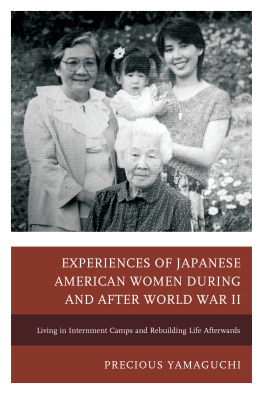
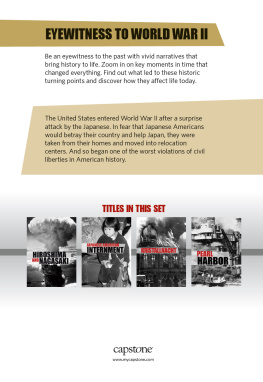
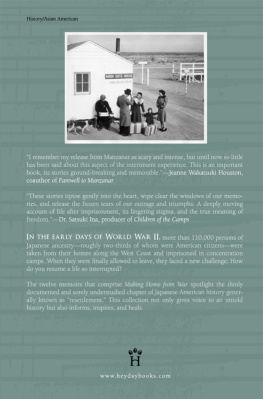
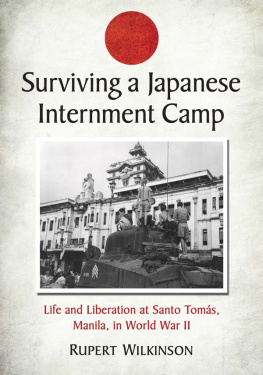
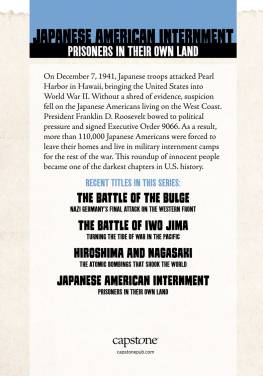
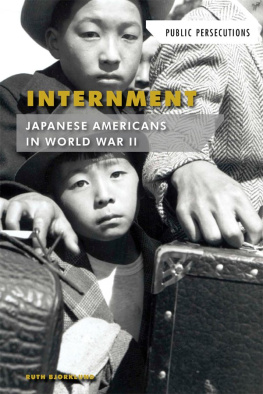
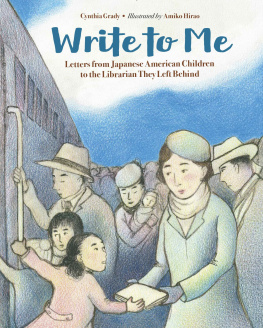
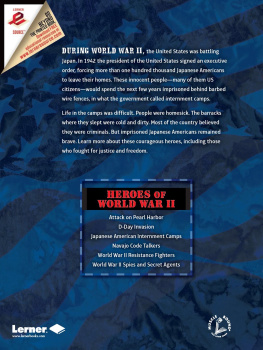

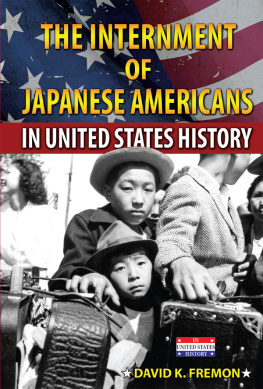
 The paper used in this publication meets the minimum requirements of American National Standard for Information SciencesPermanence of Paper for Printed Library Materials, ANSI/NISO Z39.48-1992.
The paper used in this publication meets the minimum requirements of American National Standard for Information SciencesPermanence of Paper for Printed Library Materials, ANSI/NISO Z39.48-1992.